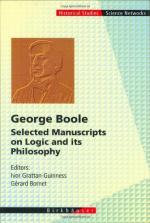|
This section contains 1,486 words (approx. 5 pages at 300 words per page) |

|
Overview
Until the English mathematician George Boole (1815-1864) came along in the nineteenth century, logic was regarded as a branch of philosophy. By codifying it in algebraic form, Boole brought it into the realm of mathematics. His work formed the basis for the digital logic that drives today's computer and communications technologies.
Background
Logic deals with rules of correct reasoning. There are two types of logical arguments. Inductive reasoning generalizes from previous experience. Therefore it provides us with probabilities rather than certainties. Inductive reasoning is the basis of what we often call "common sense." For example, if you are eating a bunch of grapes, and every grape you have eaten so far is sweet, you expect the next one to be sweet as well. It probably will be, but there are no guarantees.
Deductive logic does...
|
This section contains 1,486 words (approx. 5 pages at 300 words per page) |

|


